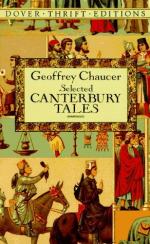|
This section contains 1,993 words (approx. 5 pages at 400 words per page) |

|
Writing over twelve hundred years after Statius, Giovanni Boccaccio undertook in the Teseida to compose the first martial epic in Italian. He placed epic formulae of invocation at the beginning of the poem, and equally conventional addresses to his book and to the Muses at its conclusion; he imitated epic structure (the Teseida, like the Aeneid and the Thebaid, has twelve books) and diction, reinforcing the latter by some nearly verbatim translations from Statius. But if, in all these ways, Boccaccio self-consciously donned the epic mantle, he also brought to his encounter with Statius literary sensibilities formed by medieval courtly romance and lyric, and thereby created in the Teseida a new, hybrid version of the noble life. Boccaccio's eclecticism declares itself at the poem's beginning; he will tell of "the deeds of Arcita and of Palemone the good, born of royal blood, as it seems, and both...
|
This section contains 1,993 words (approx. 5 pages at 400 words per page) |

|




